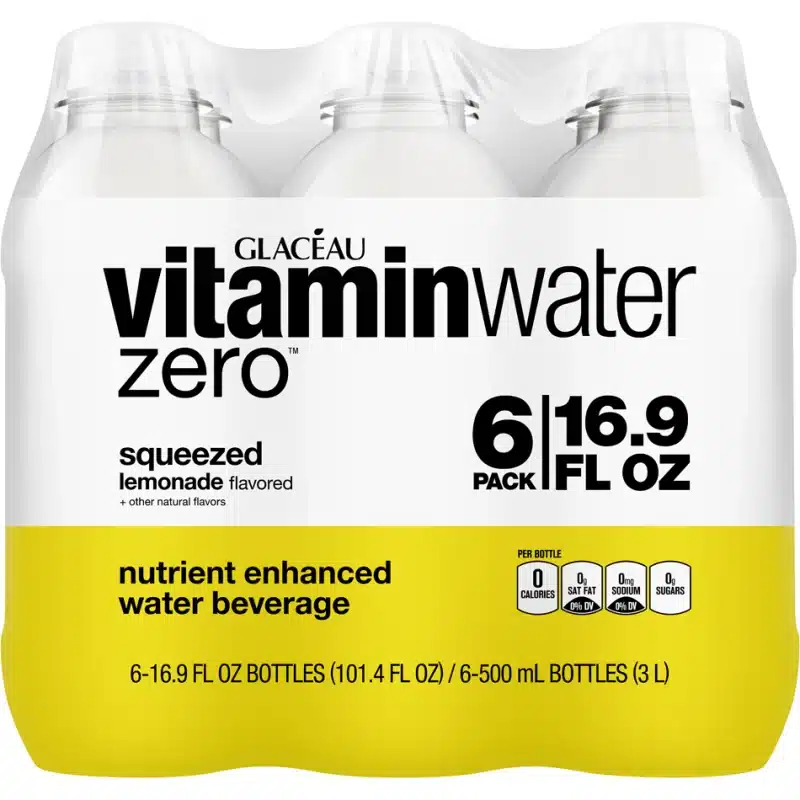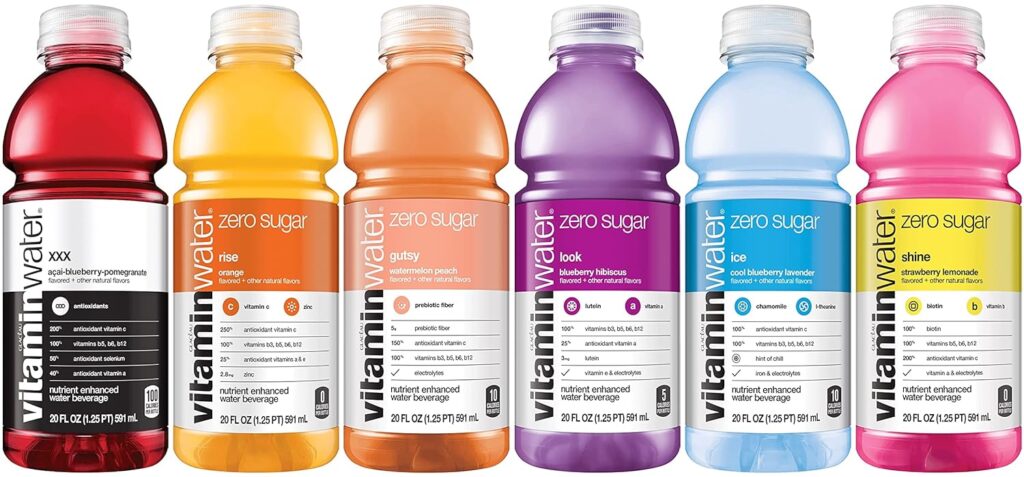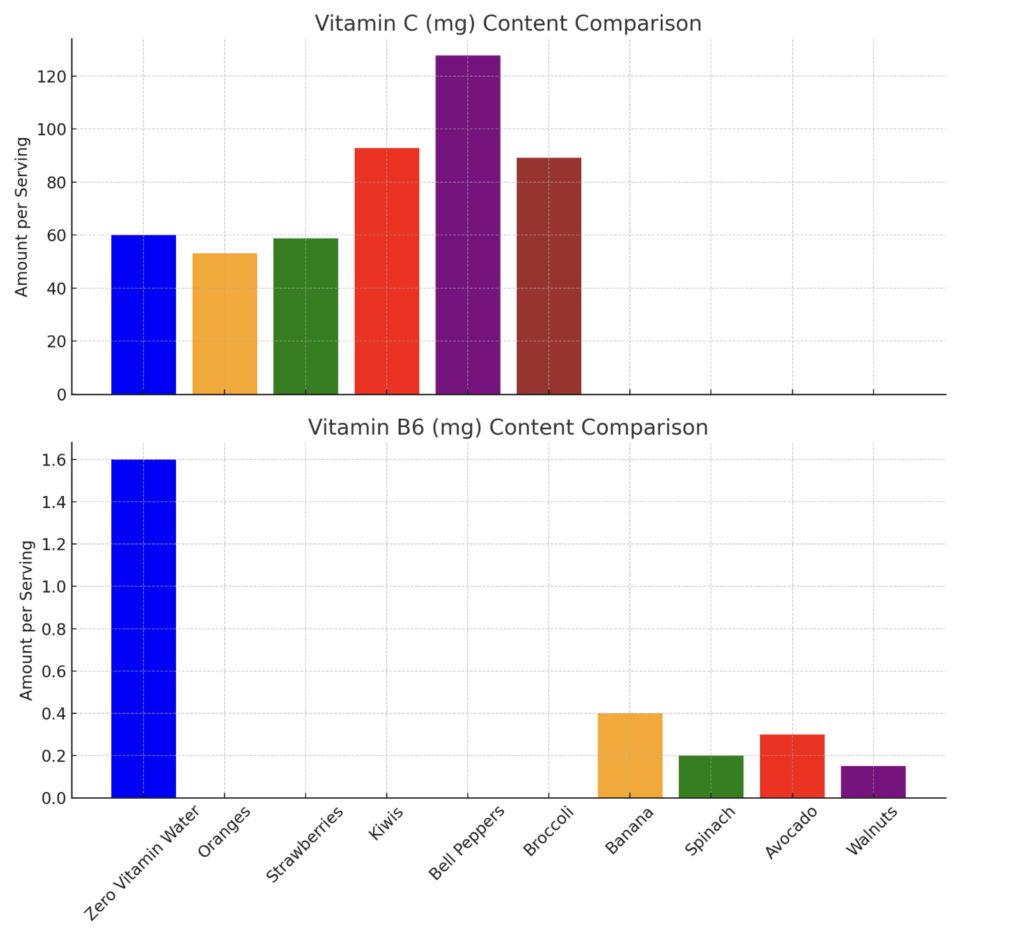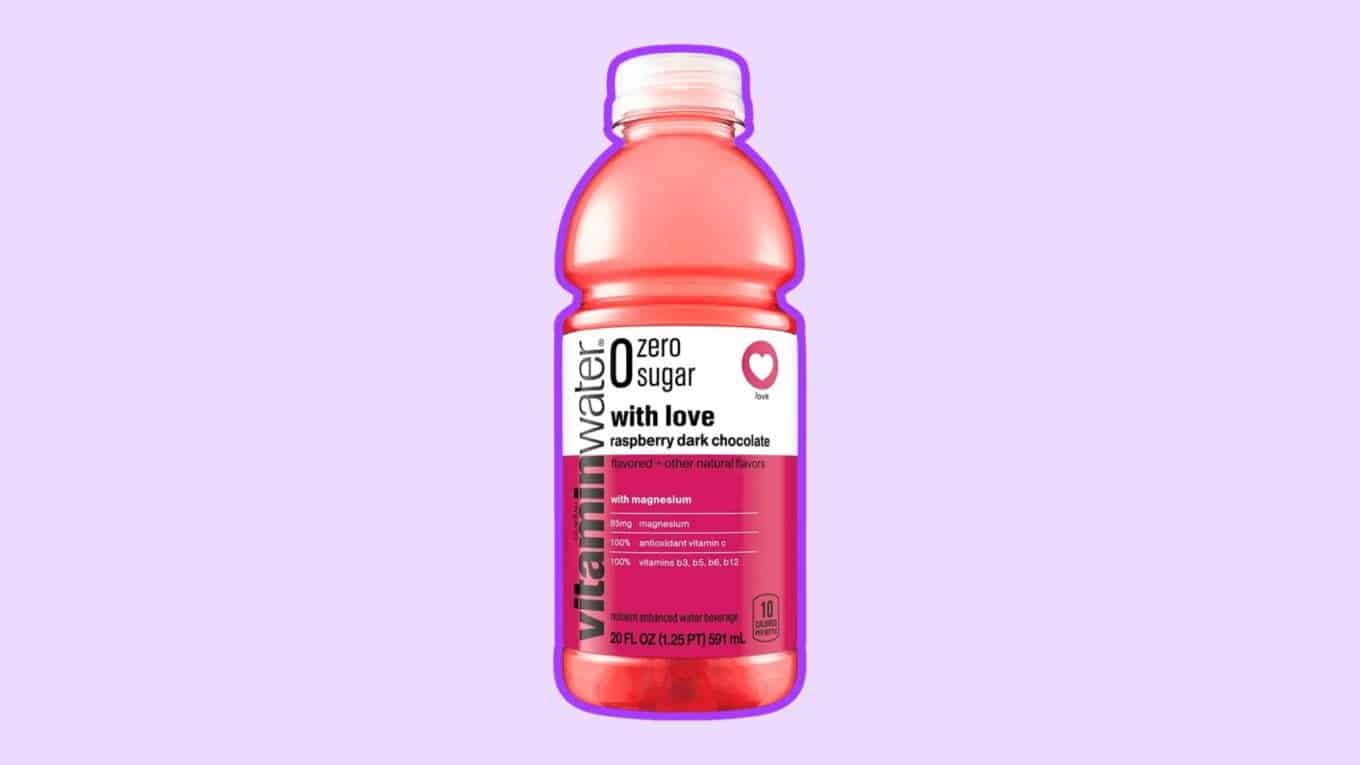In today’s health-conscious world, many people search for beverages that offer more than just hydration.
Zero Vitamin Water has gained popularity as a promising option. It claims to provide essential nutrients without the added sugars found in many drinks.
However, with so many choices available, it’s natural to wonder if Zero Vitamin Water truly lives up to the hype surrounding its nutritional value.
In this article, we will examine the ingredients and benefits of Zero Vitamin Water in more detail, helping you understand what makes it a unique choice in the beverage market.
We will explore the various vitamins and minerals it contains and its potential advantages and drawbacks, empowering you to decide whether Zero Vitamin Water is the right fit for your lifestyle and health goals.
What is Zero Vitamin Water?

Vitamin Water Zero is a popular beverage designed to provide hydration without the added sugars commonly found in other drinks.
It’s marketed as a healthier choice for those seeking to quench their thirst while enjoying a flavorful experience.
Key Features of Vitamin Water Zero
- Zero calories per serving
- Enriched with a blend of essential vitamins and minerals
- Supports daily nutritional needs
Nutritional Breakdown
Vitamin Water Zero is more than just a sugar-free beverage; it’s fortified with various vitamins and carbohydrates that can contribute to overall health and well-being.
| Nutrient | Content | Comments |
|---|---|---|
| Vitamin C | 120% of Daily Value per bottle | Supports the immune system, skin health, and antioxidant activity |
| Vitamin B6 | 80% of Daily Value per bottle | Important for metabolism, brain function, and energy levels |
| Vitamin B12 | 80% of Daily Value per bottle | Crucial for nerve function and the production of DNA |
| Vitamin E | 20% of Daily Value per bottle | Acts as an antioxidant, protecting cells from damage |
| Calorie Content | 0 calories per serving | Achieved through the use of non-nutritive sweeteners |
| Sweeteners | Erythritol and Stevia | Erythritol contributes minimal calories, while stevia has none |
| Carbohydrates | 4 grams per bottle, derived from erythritol | Low impact on calorie content due to erythritol’s properties |
Benefits of Vitamin Water Zero
1. A Healthier Alternative to Sugary Drinks
Vitamin Water Zero offers a refreshing way to quench your thirst while avoiding the high sugar content in soft drinks and fruit juices.
By choosing this zero-sugar option, you can reduce your overall sugar intake and make a more health-conscious choice regarding staying hydrated.
2. A Convenient Source of Key Nutrients
Each bottle of Vitamin Water Zero contains vitamins such as Vitamin C, B6, B12, and E, which play crucial roles in immune function, energy metabolism, and antioxidant protection.
Vitamin Water Zero can be a convenient supplementary source for individuals who may not always obtain optimal amounts of these vitamins from their diet.
3. Ideal for Calorie-Conscious Consumers
Whether following a specific diet plan or simply aiming to maintain a healthy weight, Vitamin Water Zero allows you to stay hydrated without consuming additional calories.
This zero-calorie feature can benefit individuals on calorie-restricted diets who still want to enjoy flavored beverages.
4. Free from Artificial Colors and Preservatives
Vitamin Water Zero prides itself on being formulated without artificial colors or preservatives, appealing to consumers who prioritize cleaner ingredient lists.
Vitamin Water Zero eliminates artificial additives, offering a more natural alternative to beverages that rely on synthetic colors and preservatives.
This aspect can be particularly important for health-conscious individuals seeking to minimize their artificial ingredient intake.
Potential Drawbacks of Zero Vitamin Water
1. Added Artificial Sweeteners
While Vitamin Water Zero achieves its zero-calorie status by using artificial sweeteners like stevia and erythritol, there are ongoing discussions about the potential health implications of these ingredients.
Some studies suggest that regular consumption of artificial sweeteners may impact metabolic health and alter gut bacteria populations.
Although more research is needed to understand these effects fully, some consumers may prefer to avoid caution and limit their intake of artificially sweetened beverages.
2. The Risk of Excessive Micronutrient Intake
Although the added vitamins in Vitamin Water Zero can be beneficial, it’s important to consider the potential risks associated with consuming too much of certain nutrients.
Overconsuming specific vitamins and minerals, especially if they are already obtained in sufficient amounts from a balanced diet, can lead to adverse health effects such as vitamin toxicity or imbalance.
It’s crucial to view Vitamin Water Zero as a supplementary source of nutrients rather than relying on it as a primary means of meeting dietary needs.
3. Limitations in Comparison to Whole Foods
While Vitamin Water Zero offers certain nutritional benefits, it’s important to recognize that it cannot fully replace the comprehensive nutrition provided by whole foods.
Whole foods, such as fruits, vegetables, whole grains, and lean proteins, offer a wide array of essential nutrients, including fiber, protein, and various micronutrients that extend beyond the limited vitamin profile found in Vitamin Water Zero.
Maintaining a balanced and diverse diet remains crucial for optimal health and should not be overlooked in favor of relying solely on fortified beverages.
4. The Challenges of Plastic Waste
The production and disposal of plastic bottles used for Vitamin Water Zero contribute to the ongoing issue of plastic waste.
Consumers who prioritize eco-friendly practices may opt for reusable water bottles and seek more sustainable hydration options to minimize their environmental impact.
5. The Perception of Artificial Taste
Some individuals may find the taste of stevia and erythritol less satisfying than sugar-sweetened beverages’ sweetness.
This perceived difference in taste could affect enjoyment and overall satisfaction with the product, leading some consumers to prefer alternative hydration options that align more closely with their taste preferences.
Zero Vitamin Water Flavors
| Variety | Flavor Description |
|---|---|
| Squeezed | Lemonade flavor with a refreshing zest |
| Rise | Orange flavored for a citrusy kick |
| Power-C | Dragonfruit flavored with a tropical twist |
| XXX | Acai-Blueberry-Pomegranate for a berry mix |
| Essential | Orange-mango blend for a fruity burst |
| Focus | Kiwi-strawberry fusion for a sweet touch |
| Revive | Fruit punch for a classic sweet taste |
| Glow | Strawberry guanabana for a unique twist |
| Refresh | Tropical mango for a sunny flavor |
| Energy | Tropical citrus for an energizing flavor |
Marketing and Target Audience

Vitamin Water Zero has positioned itself as a go-to choice for health-conscious consumers seeking a convenient way to stay hydrated and support their nutritional goals.
1. Lifestyle-Oriented Marketing
The brand has employed various marketing strategies to appeal to its target audience, such as:
- Sponsoring fitness events and partnering with athletes
- Emphasizing the importance of staying hydrated during physical activities
- Showcasing the product’s vibrant packaging and diverse flavor options
2. Appealing to Health-Conscious Consumers
Vitamin Water Zero’s target consumer base includes:
- Individuals focused on maintaining a balanced diet
- People looking to reduce their sugar and calorie intake
- Those seeking convenient ways to incorporate vitamins and minerals into their daily routine
- Active individuals who prioritize proper hydration
By offering a refreshing, zero-calorie beverage fortified with essential nutrients, Vitamin Water Zero aims to cater to the needs and preferences of health-minded consumers in the modern beverage market.
Other Natural Sources of Vitamins

While fortified beverages like Vitamin Water Zero offer a convenient way to increase vitamin intake, it’s crucial to recognize the importance of obtaining vitamins from natural sources.
Compared to fortified beverages, obtaining vitamins from natural sources offers several key advantages:
- The presence of dietary fiber aids in digestion and promotes feelings of fullness
- The absence of artificial additives and sweeteners eliminates concerns about potential adverse health effects
- The synergistic effects of naturally occurring nutrients enhance overall absorption and utilization by the body
1. Fruits and Vegetables: Nature’s Vitamin Powerhouses
- Oranges and strawberries are excellent sources of Vitamin C, which supports immune function and skin health
- Spinach is a rich source of Vitamin B6, contributing to energy metabolism and nervous system function
- Almonds are packed with Vitamin E, a powerful antioxidant that helps protect cells from oxidative stress
2. Whole Grains and Nuts
Nutrient-Dense Staples Whole grains and nuts are not only great sources of B vitamins and Vitamin E but also provide a host of other essential nutrients:
- Whole grains like brown rice, quinoa, and oats offer complex carbohydrates, fiber, and minerals like magnesium and zinc
- Nuts like walnuts, pistachios, and cashews are rich in healthy fats, protein, and minerals like selenium and copper
Final Words
In conclusion, while Vitamin Water Zero may seem like a convenient and appealing choice for those looking to stay hydrated and increase their vitamin intake, it’s important to consider the potential drawbacks and the superior benefits of obtaining vitamins from natural sources.
By incorporating a variety of whole foods into your diet, such as fruits, vegetables, nuts, and whole grains, you can enjoy a comprehensive nutritional profile that supports overall health and well-being.
These natural sources provide essential vitamins and offer the added benefits of dietary fiber, antioxidants, and the synergistic effects of various nutrients working together.
So, the next time you reach for a bottle of Vitamin Water Zero, remember that nature’s reward is the ultimate source of the vitamins your body needs to thrive.
Frequently Asked Questions
Is Vitamin Water Zero Better than Soda?
Vitamin Water Zero is better than soda as it has no sugar or calories, but it’s not as healthy as plain water or natural vitamin sources.
Does Drinking Vitamin Water Count as Drinking Water?
Vitamin Water Zero counts as water intake since it’s mostly water, but it’s best to drink plain water for optimal hydration primarily.
Does Vitamin Water Zero Have Electrolytes?
Vitamin Water Zero contains some electrolytes, like potassium and magnesium, but in lower amounts than sports drinks specifically designed for electrolyte replenishment.




